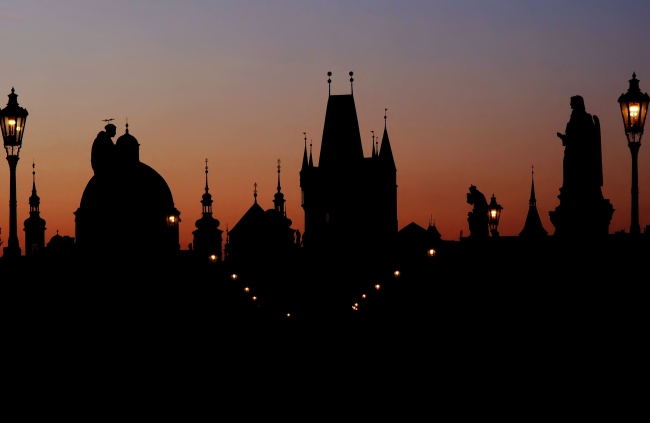AFTER DVOŘÁK AND SMETANA: CZECH MUSIC IN THE 20th CENTURY
by Leon Botstein
The four composers on this ASO program were major twentieth-century figures in the musical tradition of a region in Central Europe: the Czech lands of Bohemia and Moravia, famed for contributions to European culture, particularly in music. The historic capital of Bohemia, Prague is now the capital of the Czech Republic. Before this, it was the capital of a nation spliced together after the end of World War I—Czechoslovakia—which existed from 1918 until the fall of the Soviet Empire just over a quarter of a century ago, when it was divided into the Czech Republic and Slovakia.
Prior to 1918, both major regions of today’s Czech Republic—Bohemia and Moravia—had been part of the Habsburg Empire. The historic center of gravity in that dynastic and much maligned multi-national Empire was Vienna. Already in the 18th century these regions were centers of German (not Czech) high culture. Mozart’s Don Giovanni was premiered in Prague. Franz Kafka is perhaps the best-known figure from the vital German-speaking Jewish community of Prague into which Erwin Schulhoff was born.
Indeed, from the Baroque era on, music was a distinctive component of Bohemian and Moravian life. In the mid-19th century, two Czech composers rose to international fame: Antonín Dvořák and Bedřich Smetana. Dvořák’s career was assisted by support from Vienna through the advocacy of Brahms. Smetana—who wrote both the first famous Czech national opera, The Bartered Bride, and the best-known national cycle of tone poems, Má Vlast—was ironically far more comfortable in German than in the Czech language, and he spent an important part of his career in Sweden.
But despite their affiliation with German culture, both composers became associated with a burgeoning Czech nationalism that blossomed after the Habsburg defeat at the hand of the Prussians in 1866. Once the Habsburg Empire began to crumble, a Prussian-dominated German nation was configured which excluded the Habsburg lands, in which German was spoken, particularly Austria and the lands where these composers were born. Although they were citizens of the same empire as the Germans and Austrians, Dvořák and Smetana came to be seen as Czech nationalists.
It is ironic in the context of the current revival of extreme nationalism in Central and Eastern Europe and the fragility of the European Union that, in retrospect, the multi-national Habsburg Empire may have been a far more promising framework than once thought for the expression of disparate linguistic and cultural autonomy within a tolerant, pluralist governing political structure. But in the late 19th century the Empire, which was centered in Vienna (and after 1867 in Budapest), was seen as archaic and oppressive.
In turn-of-the-century and early twentieth-century Czech musical life, opposing camps emerged: one centered around Smetana (viewed to be the more radical nationalist voice) and one around Dvořák (a figure seen as more loyal, politically, to the Habsburg model). Two of the composers on this program were students of Dvořák: Josef Suk (his son-in-law) and Vítězslav Novák. Like Dvořák, on whose music both Brahms and Wagner exerted influence, Suk and Novák were acutely aware of their leading German-speaking contemporaries, Richard Strauss and Gustav Mahler (who was born in Moravia). In the cross currents of political ferment in the late nineteenth and early twentieth centuries, Prague became more than a place in which national sentiment flourished; it became a major center of modernist innovation in literature, art, and music.
Bohuslav Martinů (who spent a great deal of his career in Paris and the United States) was a Czech patriot who felt the trials of exile keenly. He was brilliant and prolific and more of his music deserves to be heard. Schulhoff, who began as an experimental modernist in the Kafka mold, eventually turned to communism. His achievements can be rightly compared to those of his Czech-Jewish German-speaking contemporaries in other fields: Kafka and the writers Egon Erwin Kisch and Max Brod (who played a decisive role in bringing the great original Moravian-Czech composer of the previous generation, Leos Janáček, to international attention during the interwar years). But Schulhoff is now mostly remembered as a victim of the Nazis, and not the major European composer he was.
This concert offers the public an opportunity to sample the achievements of the music that emerged from a tumultuous era of political change. The post-Habsburg development of nationalism, democracy, fascism, anti-Semitism, and socialism all collided in the twenty years of Czechoslovakia after 1918. In 1938, democratic Czechoslovakia was dismembered by the Nazis; after 1945 it fell within the Soviet Empire.
However, the composers on this program all represented a sense of nationalism compatible with a vital cosmopolitan culture, both Czech and German. Their remarkable output is a welcome reminder of the urgent need for an alternative to the narrow xenophobic and provincial nationalisms that have, in recent years, reasserted their allure and power—nationalisms that are unlikely to offer the multi-faceted sources of inspiration that Suk, Novák, Martinů, and Schulhoff drew upon.
On a personal note, I would like to dedicate this concert to the memory of Rudolf Firkušný (1912–94), the consummate musician and phenomenal pianist, student of Janáček’s, and ardent partisan of the democratic Czechoslovakia in which he grew up. It was through Firkušný, a close friend of Martinů’s, that I first became acquainted with the music of the composers on this program, particularly the works of Suk and Novák.

